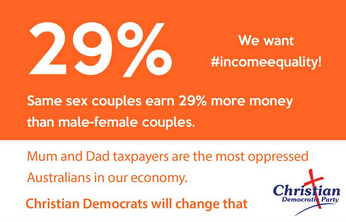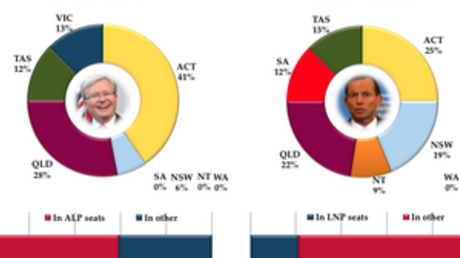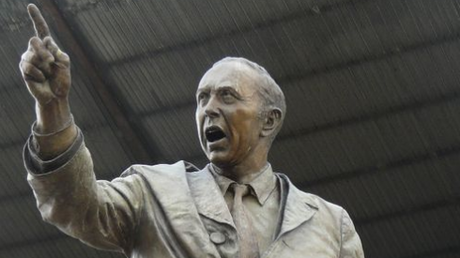 TODAY, ONE of the most viewed images in the political twittersphere has been a flyer released by Fred Nile's Christian Democratic Party, implying that gay couples recieve preferential tax arrangements to the detriment of heterosexual couples. Reverend Nile is a strong opponent of gay marriage. University of Melbourne student Claire Boland considers the state of the gay marriage debate in Australia.
TODAY, ONE of the most viewed images in the political twittersphere has been a flyer released by Fred Nile's Christian Democratic Party, implying that gay couples recieve preferential tax arrangements to the detriment of heterosexual couples. Reverend Nile is a strong opponent of gay marriage. University of Melbourne student Claire Boland considers the state of the gay marriage debate in Australia.
As a child, Jacob Thomas experienced first-hand the social stigma of being a DSG youth – of Diverse Sexuality or Gender.
He was bullied from the first day he walked through the gates of primary school, and suffered ongoing torment and abuse from his peers.
Mr Jacob is now the National Manager of Business Development for the It Gets Better organisation, which aims to improve the mental wellbeing of DSG youth.
He feels strongly that being treated like an outsider contributes greatly to the far higher depression and suicide rates of homosexual Australians.
He’s a supporter of gay marriage, because he believes it would be a formal step that would reduce the social stigma of homosexuality and normalise same sex relationships.
Conservative interest groups will throw money behind anti-gay marriage campaigns
Marriage laws have been subject of prominent debate in Australia in recent years, especially as other Western countries such as New Zealand and France are increasingly moving towards a more inclusive definition of marriage.
Melbourne Greens MP Adam Bandt introduced a bill last year to legalise same-sex marriage.
Mr Bandt says when the bill was considered by a Senate Inquiry, it received over 25,000 submissions – “more submissions than any other inquiry every had”
64% of survey respondents supported marriage equality, and Mr Bandt predicts that support would be even higher within his own constituency.
But the bill hasn’t gone to a vote in the House of Representatives.
Bandt believes the government’s failure to enact equal marriage laws is partly due to “old thinking,” partly because both major leaders fear backlash from conservatives, and partly due to the prohibition of a conscience vote within the Coalition.
“Predominantly, it is the fear of leading, even though the public is already there,” he said. “If one or both of the party leaders came out in support of equal marriage, I believe it would be an extraordinarily popular move.”
Independent MP Tony Windsor has suggested holding a plebiscite to gauge public support for marriage equality.
Perhaps surprisingly, prominent groups campaigning for marriage equality such as Australian Marriage Equality are largely against a plebiscite, and groups against marriage equality have welcomed a possible plebiscite.
Bandt says a plebiscite would be an unnecessary expense as members of Parliament have already been elected by the public to create laws on their behalf. “We don’t need a plebiscite into every piece of legislation. New Zealand didn’t have a referendum when they passed equal marriage recently. We need to just get on with it.”
He and many others also hold concerns that conservative interest groups will throw money behind anti-gay marriage campaigns, demonising and further marginalising people of diverse sexualities.
Christian groups led by the Reverend Fred Nile have confirmed that significant resources would be put behind campaigning to keep marriage ‘traditional’.
Reverend Nile and Australian Christian Lobby spokesman Lyle Shelton have expressed firm belief that Australians would reject a change to our marriage laws.
A national plebiscite seemed highly unlikely a few months ago given its lack of Parliamentary support. However Kevin Rudd, back in the office of Prime Minister, has reignited the debate by saying that if the Coalition fails to allow a conscience vote he would support a plebiscite on election day.
Penny Wong, who was appointed by Rudd to lead the Senate and is in a long-term same-sex relationship, is in strong opposition to a public vote. ‘While an increasing majority of the public support marriage equality, a referendum would not be without risk,’ she said.
Wong used the vote to make Australia a republic as an example of a referendum that initially had the support of the public, but ended up losing in every state after the Coalition ran ‘a very good fear campaign.’
Regardless of whether a plebiscite goes ahead, Bandt believes that marriage equality has become a matter of ‘when’ not ‘if’ in Australia. “The public has already moved on and decided that they want to do the right thing,” he says. “It is inevitable that our politicians will catch up – not only because it is the popular thing to do, but because it is the right thing to do.”
The views expressed by Jacob Thomas in this article are based on his own experiences and personal beliefs, and do not necessarily reflect the values of It Gets Better as a campaign or organisation. It Gets Better is not politically aligned and aims only to provide mental health support for DSG youth.
Claire Boland is a third year student studying Politics and International Studies, and Media/Communications.



